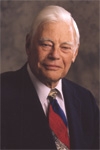Search
January 28, 2008 - At 90, He Lives the Lifestyle He Preaches
By BILLY BAKER, The Boston Globe
Originally Published The Boston Globe, January 28, 2008
 |
| Scrimshaw |
Dr. Nevin Scrimshaw, one of the fathers of the nutrition movement, practices what he preaches. Which is why he's something of an expert on the senior skiing policies at New England mountains.
"When I turned 70, I could ski for free at Waterville Valley," Scrimshaw said in a phone interview from his home in Thornton, N.H., not far from the mountain. "Then when I was 79, they moved the age up to 80, so I had to buy a season ticket for a year."
"Now that I'm 90," he said of the milestone he celebrated - on the slopes of course - on Jan. 20, "I get a pass that's good at Loon and a couple of other places. Which is great."
Scrimshaw, though, is more than just a nonagenarian capable of barreling down a mountain on a pair of planks. He is still an institute professor emeritus at MIT - the elite of the faculty - as well as an adjunct professor at Tufts University, a senior adviser to United Nations University, and president of the Boston-based International Nutrition Foundation, a food and nutrition advocacy group for developing countries.
A typical day for Scrimshaw involves skiing in the morning (or a hike in the mountains in the warmer months) followed by some weight training at a gym, a healthy lunch with his wife of 67 years, Mary, and then five or six hours at the computer writing and editing. This is assuming he's not traveling; last year he taught workshops in India, Bangkok, Taipei, and Ghana, and he has ongoing research projects in Syria and Bangladesh.
"I really don't feel that different from 10 years ago," he said. "And I intend to keep this lifestyle as long as I can.
"People ask me what the secret is, and I think there are several. One is I'm physically and mentally active. Another is I follow a pretty optimal diet. And the third is that I lead a very stress-free life. I have a wonderful marriage, the children and grandchildren are doing well, and I've received all the professional recognition that anybody could ask for. I'm very satisfied."
Professional recognition was not in the cards when, in 1949, Scrimshaw left the University of Rochester, where he had been doing postdoc research on the effect of nutrition and pregnancy complications, to found the Institute of Nutrition of Central America and Panama.
"My professors thought I was throwing my career away," he said of his move to focus on nutrition, which was not viewed as one of the prestige medical subjects at the time. "Even my wife said, 'If you do this, you know you're going to be identified with nutrition for now on.' "
He spent 12 years running the institute in Guatemala, where he developed low-cost, innovative solutions to help combat malnutrition, protein-deficiency, and iodine-deficiency in developing countries, and conducted some groundbreaking research on the connection between nutrition and infection. By 1961, academia took notice, and MIT invited him to join its faculty as a full professor and to found its Department of Nutrition and Food Science.
In his 60-plus years in nutrition, Scrimshaw has watched the field "explode," both in the medical community and in the popular consciousness.
"Diabetes and heart disease are overwhelming our health system," said Scrimshaw, who was awarded the 1991 World Food Prize, the highest honor in the field. "And that makes nutrition something more than academic."
For Scrimshaw personally, the importance of nutrition became more than academic 25 years ago, when he had to have triple bypass surgery.
"I hadn't taken optimal care of myself, and decided I wasn't going to let that happen again," he said of his decision to adopt a serious diet - low-fat, lots of fish and white-meat poultry, with plenty of fruits and vegetables - and focus on weight control and physical activity. But he says that one of the secrets to health and longevity, which people often miss, is consistency.
"People love to say, 'Oh, just this one time.' Or, 'This is a special occasion.' You can't do it."
"I enjoy chocolate," he said, admitting to his one guilty pleasure. "But in moderation.
"Plus, there's evidence that there's some benefit to chocolate. That's a bonus I hadn't expected."
Fact sheet
Hometown: Born in Milwaukee; lives in Thornton, N.H.
Education: Undergraduate degree in biology from Ohio Wesleyan in 1938. Three degrees from Harvard: master's in biology (1939), doctorate in physiology (1941), and a master's in public health (1959). And an MD from the University of Rochester in 1945.
Family: Married to Mary for 67 years. Daughter, Susan Scrimshaw, is the president of Simmons College. Four sons: Nevin, an information technology administrator; Steven, a teacher at the Cambridge School of Weston; Nat, executive director of the Margret and H.A. Rey Center, a cultural center modeled around the ideals of the "Curious George" book authors; and Norman, who teaches Buddhist meditation. He has eight grandchildren.
Hobbies: Scrimshaw skis regularly, takes walks in the mountains during the summer, and maintains large vegetable and flower gardens
|
| URL for this article: |


